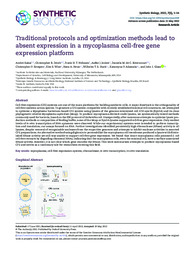Traditional protocols and optimization methods lead to absent expression in a mycoplasma cell-free gene expression platform.
Traditional protocols and optimization methods lead to absent expression in a mycoplasma cell-free gene expression platform.
Autoria: SAKAI, A.; DEICH, C. R.; NELISSEN, F. H. T.; JONKER, A. J.; BITTENCOURT, D. M. de C.; KEMPES, C. P.; WISE, K. S.; HEUS, H. A.; HUCK, W. T. S.; ADAMALA, K. P.; GLASS, J. I.
Resumo: Cell-free expression (CFE) systems are one of the main platforms for building synthetic cells. A major drawback is the orthogonality of cell-free systems across species. To generate a CFE system compatible with recently established minimal cell constructs, we attempted to optimize a Mycoplasma bacterium-based CFE system using lysates of the genomeminimized cell JCVI-syn3A (Syn3A) and its close phylogenetic relative Mycoplasma capricolum (Mcap). To produce mycoplasma-derived crude lysates, we systematically tested methods commonly used for bacteria, based on the S30 protocol of E. coli. Unexpectedly, after numerous attempts to optimize lysate production methods or composition of feeding buffer, none of the Mcap or Syn3A lysates supported cell-free gene expression. Only modest levels of in vitro transcription of RNA aptamers were observed. While our experimental systems were intended to perform transcription and translation, our assays focused on RNA. Further investigations identified persistently high ribonuclease activity in all lysates, despite removal of recognizable nucleases from the respective genomes and attempts to inhibit nuclease activities in assorted CFE preparations. An alternative method using digitonin to permeabilize the mycoplasma cell membrane produced a lysate with diminished RNAse activity, yet still was unable to support cell-free gene expression. We found that intact mycoplasma cells poisoned E. coli cell free extracts by degrading ribosomal RNAs, indicating that the mycoplasma cells, even the minimal cell, have a surface-associated RNAse activity. However, it is not clear which gene encodes the ribonuclease. This work summarizes attempts to produce mycoplasma-based CFE and serves as a cautionary tale for researchers entering this field.
Ano de publicação: 2022
Tipo de publicação: Artigo de periódico
Palavras-chave: Cell-free expression system, In vitro transcription, In vitro translation
Observações
1 - Por padrão são exibidas publicações dos últimos 20 anos. Para encontrar publicações mais antigas, configure o filtro ano de publicação, colocando o ano a partir do qual você deseja encontrar publicações. O filtro está na coluna da esquerda na busca acima.
2 - Para ler algumas publicações da Embrapa (apenas as que estão em formato ePub), é necessário ter, no celular ou computador, um desses softwares gratuitos. Sistemas Android: Google Play Livros; IOS: iBooks; Windows e Linux: software Calibre.
Acesse outras publicações
Acesse a Base de Dados da Pesquisa Agropecuária (BDPA) para consultar o acervo completo das bibliotecas da Embrapa.

